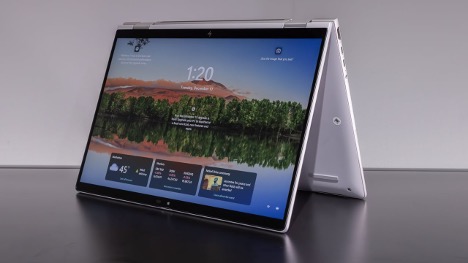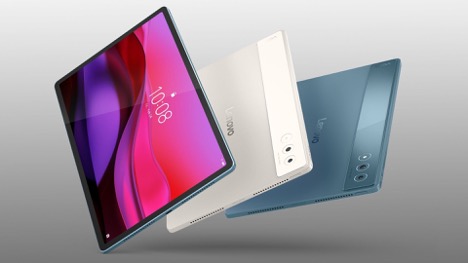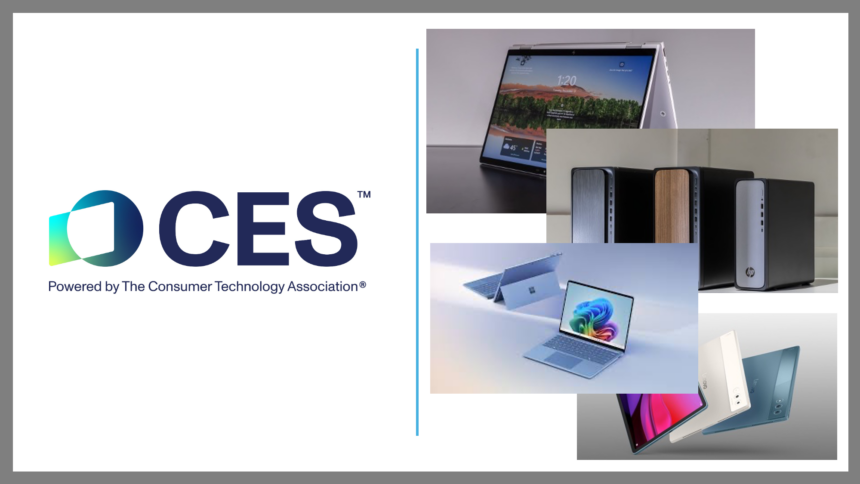At CES 2025, the buzz is about laptops and desktops packing AI-powered features, from sleek budget models to high-end workstations. HP, Lenovo, and Dell are all unveiling new products that make your tech experience faster, smarter, and more personalized. These devices have cutting-edge processors, stunning displays, and AI capabilities. Let’s dive into what’s happening and why it matters.
What’s Happening & Why This Matters
HP is stepping up its game with the launch of its OmniDesk series, combining style with AI performance. The OmniDesk PCs come in a full-size tower and a slimmer, more compact variant. Both feature powerful Intel Core Ultra and AMD Ryzen processors, offering options for better performance whether you’re running AI tasks or need a reliable workstation. These desktops come with sleek wood-paneled fronts, seamlessly blending into your living space. While the Slim version offers a more budget-friendly setup, the full-size OmniDesk towers are AI-ready, with options like Microsoft Copilot key functionality on the keyboard.

HP’s EliteBook line also gets a boost with AI. The new EliteBook Ultra G1i and EliteBook X Flip G1i come powered by Intel Core Ultra processors, equipped with Neural Processing Units (NPUs) to enhance AI tasks like video call improvements, faster data processing, and better security. These models include everything modern professionals need: fast SSDs, stunning displays, and multiple connectivity options. HP is also rolling out the Z2 Mini G1a Workstation—a compact powerhouse for those who need AI-accelerated capabilities for tasks like 3D rendering and working with large language models (LLMs).
On the other hand, Dell is simplifying its product lineup with a new naming scheme for its laptops and desktops. No more XPS or Latitude—now, it’s all about “Dell,” “Dell Pro,” and “Dell Pro Max.” This rebranding effort aims to make it easier for consumers to choose the right model, whether it’s a budget-friendly or high-performance machine. New models will still be powered by the latest chips from Intel, AMD, and Qualcomm, designed to boost performance and AI processing.

Lenovo is making waves with its Yoga lineup, offering models like the Yoga 9i Slim, which features an innovative camera-under-display design. This unique feature maximizes screen space, bringing a sleek, high-performance laptop with AI tools for real-time video enhancement, system use adjustments, and more. Lenovo is also introducing the Yoga Book 9i, a dual-screen device aimed at creators needing top-notch rendering and encoding performance. Whether after a premium convertible or a more affordable option, Lenovo has something AI-enhanced for everyone.
These innovations aren’t just about improving performance—they’re transforming how users interact with their devices. AI features, like personalized workflows and smarter visual experiences, are becoming standard. From taking video calls to organizing data, AI is now part of the everyday experience.
TF Summary: What’s Next
CES 2025 is introducing a new wave of AI-powered laptops and desktops. HP, Lenovo, and Dell are all making big strides in bringing AI to the forefront, offering devices that are not only powerful but also smarter. As these machines hit the market in 2025, TF expects them to reshape how we work, play, and create. Whether for home use, business tasks, or high-end professional projects, AI is becoming essential to the modern computing experience. Monitor these brands as they roll out their AI-powered products throughout the year.
— Text-to-Speech (TTS) provided by gspeech


